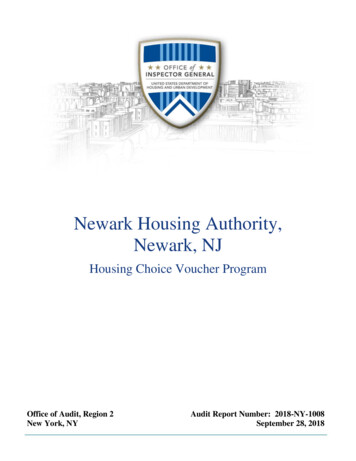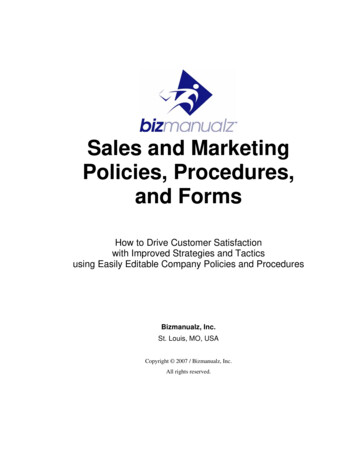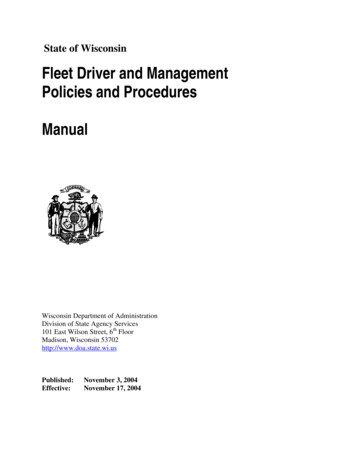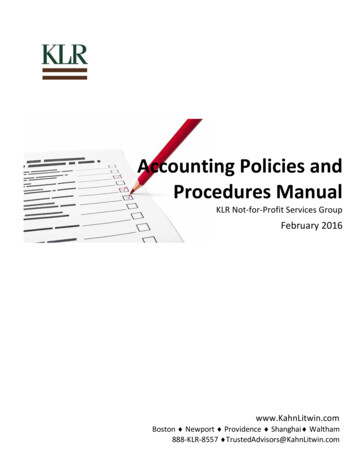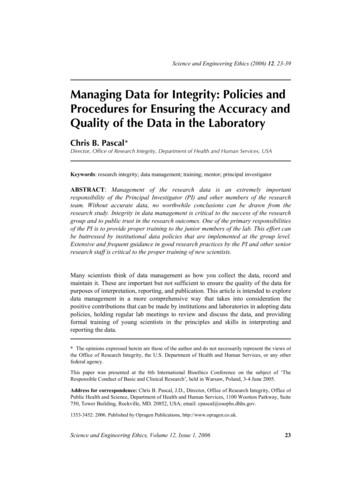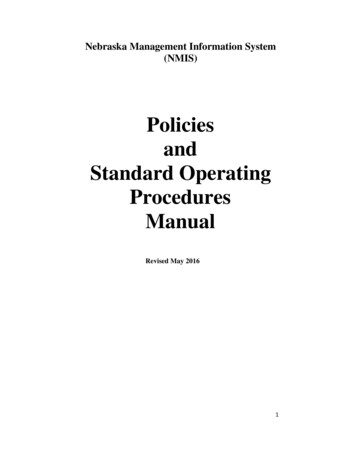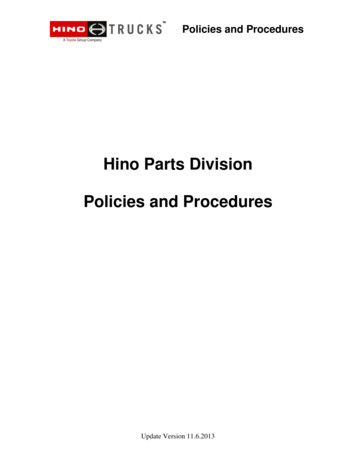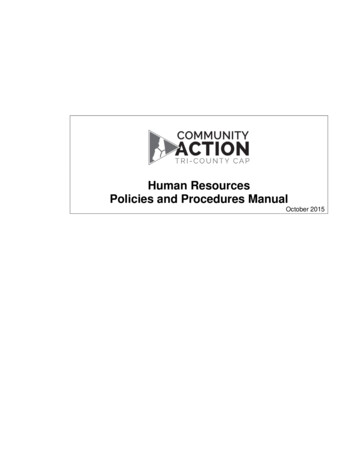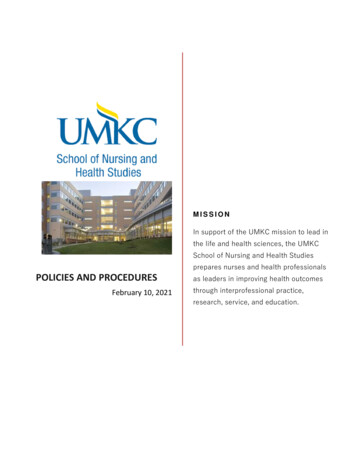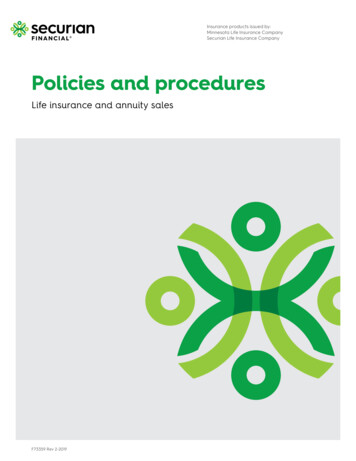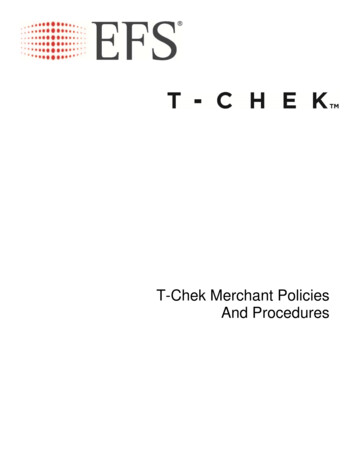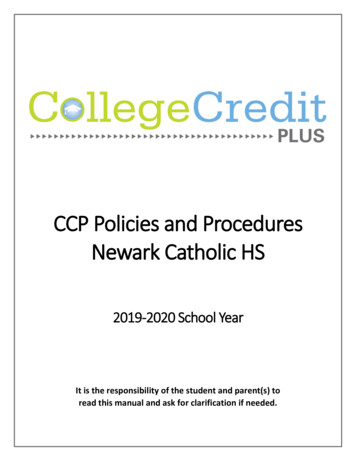
Transcription
CCP Policies and ProceduresNewark Catholic HS2019-2020 School YearIt is the responsibility of the student and parent(s) toread this manual and ask for clarification if needed.
THE CCP PROGRAMWhat is CCP? . 2Why should I take CCP classes? . 2What are some reasons I shouldn’t take CCP classes? . 2Who can participate in CCP? . 2Benefits of CCP . 3Risks and Implications of CCP . 3Impact on High School Graduation . 3COURSEWORKCredits . 4Determining how you want to participate in CCP . 4Course Selection. 4Summer Semester . 5Pathways . 6Differences between High School and College . 6HOW TO PARTICIPATEApplication Process . 7Information Session . 7Counseling Session . 7Textbooks, Fees, and Supplies . 8Funding. 8ADDITIONAL CONSIDERATIONSTechnology . 10FERPA . 10Underperforming students . 10Appeal Process for CCP Dismissal . 10Withdrawal from a course . 11Athletic Eligibility. 11Deadlines. 11HELPFUL RESOURCESACCUPLACER . 12Vocabulary . 13Contact info for CCP . 14The Checklist . 151 Page
The CCP ProgramWhat is CCP?College Credit Plus is a program funded by Ohio taxpayers that allows students in grades 7-12 to get dual, transcriptedcredit for college courses while in high school. The coursework is free from public colleges; there may be a fee fromprivate universities.CCP is limited to college-level, transcripted courses. It does not include AP or Honors courses.Students must be funded by the state through a funding application in order to be a CCP student. Students can also takecourses as “concurrent” students by self-paying; if you self-pay you cannot take the CCP courses we offer in our building,and the credit and GPA earned only count toward college, not to satisfy high school requirements.Why should I take CCP classes?The goal of CCP is to create access for students who can be admitted remediation free to a college or university. Itremoves barriers, such as the cost, and provides access. Students can accelerate their achievement of educational goals,and eliminate duplication of high school and college content. Students can increase the rigor and challenge of theircoursework.Students that experience success in CCP are responsible students, willing to ask questions and seek out assistance, canhandle an increased work load, and are self-disciplined in completing tasks independently. Students in CCP are expectedto maintain an online account with the university, submit some materials to their professor electronically, andcommunicate when they don’t understand the expectations or requirements. If a student has difficulty self-motivating,lacks self-discipline, or does not seek out help when needed, the CCP program may be too overwhelming at this time.What are some reasons I shouldn’t take CCP classes?The rigor of the material may be beyond the student’s current abilities, which could increase anxiety and impact otherclasses. The work expectations (reading, message boards for online classes, etc.) may be more than the student iswilling to commit. The grade may be lower than the student is used to getting and this can lower a student’s high schoolGPA. Once you take a class, that grade is in your college record forever. The student may not be ready for theresponsibility of taking charge of it all – setting up accounts, contacting instructors, following deadlines without adultsreminding them, etc.Who can participate in CCP?Students interested in taking CCP/Dual Enrollment courses while a student at NC must: Be a resident of OhioBe in grades 7-12 during the time of participationApply for acceptance at the college or university of your choice and be acceptedSatisfy the Uniform Statewide Standards for Remediation-Free Status, which provides for minimum threshold ofscores to determine student readiness, based on assessments such as ACT, SAT, or Accuplacer, in at least onesubject area of the exam.Limitations to participation Students with assessment scores in any subject area that do not meet the remediation-free status must bewithin one Standard Error of Measurement and have earned wither a 3.0 GPA or a recommendation from theschool counselor or principal to participate.2 Page
ooRemediation-free status refers to a student that has proven college-readiness and can succeed atcollege-level work.It is best to discuss these limitations with your counselor and an admissions rep at the college of yourchoice.Benefits of CCP Earn high school and college credits simultaneously.Complete college general education requirements prior to high school graduation.Begin and end your college career sooner.Reduce the overall cost of college.Introduced to the rigor and expectations of college work.Achieve college readiness.Ease the transition to college.Take courses not offered at NC.Students have access to the same support services available to fully matriculated students.Students are exposed to diversity through classmates and subject matter.Risks and Implications of CCP The course you take may not transfer, depending on the college you attend after high school and your major.Taking general education courses reduced this risk.Grades earned are permanently part of your high school and college transcript and GPA. These grades followyou for life.Withdrawing from or failing a course may require you to reimburse the cost of the course to the state.Withdrawing from or failing a course may impact your financial aid eligibility after you graduate from highschool.The college calendar may not align with the high school calendar regarding holidays and breaks.The attendance policy for college courses may not allow for absences that the high school permits.Exposure to mature content may be part of the class and cannot be controlled by the high school and parent.Parents do not have access to student’s records, grades, and instructors in the same way they do in high school.Issues with an instructor will need to be dealt with by the student.Some courses may have collaborative or group assignments requiring evening or weekend meetings.Impact on High School GraduationParticipating students are still required to satisfy all graduation requirements. High school credit from collegecoursework will satisfy or exceed graduation and subject area requirements. The GPA of high school is affected by thesecourses.3 Page
CourseworkCreditsStudents will take courses earning high school credits and college semester hours. The equivalency for credits is:1 semester hour 0.33 high school credit2 semester hours 0.67 high school credit3 semester hours 1.0 high school creditStudents within CCP are allowed to take 30 credit hours per year, with a maximum of 120 credits within CCP. Publicschools are required to pay for tuition out of the state money provided to each district. Nonpublic school students arefunded directly from the state, and that funding is limited. While the state law allows for 30 hours per year, the fundingdistribution rules in that law limit how much each nonpublic student receives. The most funding we have seen for asingle student to date was 12 semester hours (a senior), and most students request and receive 3, 6, or 9 semesterhours of funding for 1-3 courses.Along with the max of 30 hours, the credits that can be taken are limited by the number of “high school only” coursesthat the student is taking.30 - (HS only credits x 3) Maximum number of CCP hoursExample 1: a student is taking 6 courses at NC (Theology, English, Math, Science, Social Studies, and World Language).30 - ( 6 x 3) 30 - 18 12 A student could take 12 hrs (4 courses, typically 2/semester)Example 2: a student is taking 7 courses at NC (Theology, English, Math, Science, Social Studies, World Language, Art).30 - ( 7 x 3) 30 - 21 9A student can take 9 hrs (3 courses, maybe 1/semester: summer, fall, spring)Determining how you want to participate in CCPStudents should begin by considering their goal: what do you want to get out of CCP? That can be different for eachstudent. Some may want to earn credits for college, some want an opportunity to practice the demands of collegeclasses in a supported environment, some may want to challenge themselves with more difficult material, and somemay want the financial advantage that CCP provides. Determining your personal goal(s) can help you narrow down whatyour participation will look like.The simplest and most supported way to start CCP is by taking the classes we offer in our building. Composition I andPsychology are offered in our building, during the school day. Some classes are available at OSU and COTC in Newarkafter school hours, and students could investigate other local universities that offer classes in the evenings. Studentscould potentially take classes during the school day, but it can be difficult to schedule these around your NC classes.Online classes are an option that widens the choices available significantly. Students considering this option should beresponsible, self-motivated, mature, and assertive. Online classes require a significant amount of time outside of theschool day and reliable tech skills.Course SelectionNCHS strongly urges students to consider core subjects for CCP, maximizing their potential for transfer to the college youare attending. Both of the courses offered on NC’s campus are required subjects that most freshmen take.4 Page
LEVEL I CoursesCCP Law requires that the “First 15” hours earned within the CCP program are “Level I” courses. These courses areidentified as Level I by the college, and include: Transferable courses (Approved CTAG, OTM, TAG, or equivalent at private college or university)Courses in computer science, information technology, anatomy, physiology, or foreign language, includingAmerican Sign LanguageCourse in a designated technical certificate program15-credit hour or 30-credit hour model pathway coursesStudy skills, academic or career success skills coursesInternship coursesExceptions may be made for students to continue with courses in the same subject or for students that test directly intoa Level II course.LEVEL II CoursesOnce students have completed 15 hours in CCP, they can move on to Level II. Level II courses are any other college courses for which students meet the prerequisites.Students are encouraged to continue working toward the certificate or degree pathways started in Level I.Non-Allowable CoursesThese courses are not permitted under CCP: Applied courses with one-on-one private instructionCourses with high fees ( 750 or more, starting spring 2019)Study abroad coursesPhysical education coursesP/F or S/U graded courses (unless the course is an internship or is a transferable course with the same gradingscale for all students enrolled)Remedial coursesSectarian religion coursesSummer SemesterSummer Semester is the first semester of each academic year. Funding that is awarded in May of each year is availablefor Summer, Fall and Spring semesters.For students considering summer session, there are additional considerations. Summer sessions at the colleges offer very limited courses.Summer sessions are frequently broken up into different groups. Typically, the first session begins mid-May,and it will be too late to sign up for this session after funding is awarded.Some colleges offer a later, abbreviated, and concentrated semester term that could begin in late June or July.The courses offered during this time are offered for longer time blocks and more frequently to satisfy the timeconstraints, or are online and students will be expected to put in several hours each day to satisfy the workload.Summer sessions will not accommodate vacations and frequent or long absences. Don’t sign up and expect tofit a week-long vacation into the middle of your semester.The turnaround time for textbooks is extremely tight. We need approximately 3 weeks to order and approvetextbooks.5 Page
PathwaysTo guarantee students and families understand the options available, the Ohio Department of Higher Education requiresthat we demonstrate 2 pathways available to students to that enable them to earn either 15 credit hours or 30 credithours of college credit while in high school. The pathways listed below use COTC courses to complete.15 Credit Hours – Pathway in Criminal Justice FocusJunior Year (6 classes at NC, plus )Sem. Hours HS Credit HS Dept.Psychology31Social StudiesBasic Public Speaking31ElectiveSenior Year (6 class at NC, plus )Sem. Hours HS Credit HS Dept.Sociology31Social StudiesIntro. to Criminal Justice31ElectiveComposition I31EnglishClass ModeAt NC – AutumnOnline – SpringClass Mode@ COTC – SummerOnline – AutumnAt NC - Spring30 Credit Hours – Pathway in Business FocusSophomore Year (6 class at NC, plus )Sem. Hours HS Credit HS Dept.Basic Public Speaking31ElectivePsychology31Social StudiesManagement & Organiz. Behavior31ElectiveJunior Year (6 classes at NC, plus )Sem. Hours HS Credit HS Dept.Microeconomics31ElectiveBusiness Communications31ElectiveComposition I31EnglishSenior Year (5 classes at NC, plus )Sem. Hours HS Credit HS Dept.Intro. to Financial Accounting31ElectivePrinciples of Advertising31ElectiveComposition II31EnglishIntro. to Managerial Accounting31ElectiveClass Mode@ COTC – SummerAt NC – AutumnOnline - SpringClass Mode@ COTC – SummerOnline – AutumnAt NC – SpringClass ModeOnline - AutumnOnline – AutumnOnline – SpringOnline – SpringDifferences between High School and CollegeHIGH SCHOOLCOLLEGETESTSSTUDY TIMEKNOWLEDGEACQUISITIONWeekly or end-of-chapterHomework requires 1-3 hours/dayInformation provided in-class, out-ofclass research is minimalGRADESNumerous quizzes, tests, and homeworkassignmentsParent is student advocate, working withteachers and counselorsFewer, covering more materialHomework 2-3 hours/dayMore independent thinking, longerwriting assignments, out-of-classresearch requiredFewer tests and fewer homeworkassignments to determine gradeParent is a mentor and support for thestudent, but the student is anindependent decision maker. Parentdoes not have direct access to instructoror grades (FERPA law)Attendance policy is set by the instructorand does not necessarily accept the“excuses” that the high school uses.ROLE OF PARENTATTENDANCEGRADING POLICY6 PageAttendance may be excused due tomedical reasons; student may be allowedto leave for a school-sponsored event(field trip, etc.)Set by the school, consistent throughoutthe buildingSet by the instructor
How to ParticipateApplication ProcessThe primary responsibility of applying for CCP is in the hands of the student. Parents can assist or remind, but theapplication process is a good first test to see if the student can handle the expectations of college. They need tofollow the steps below and carefully observe the deadlines.1. Come to the Information Night in January; if you are unable to attend you must schedule a counseling sessionfor the student, parent, and counselor to discuss CCP participation.2. Decide what CCP college(s) and/or course(s) you would like to take.3. Complete an “Intent to Participate” form. Turn in to Mrs. Welch. She will return it within 2 days.4. Complete a CCP Plan form. Turn in to Mrs. Welch. This also serves as a transcript request form, so be specificabout the colleges you are applying to. This due date is March 1.5. Send the “Intent to Participate” form to ODE between February 1 and April 1.6. Apply to the college(s). This needs to be completed by the student, not parent. Be sure to follow theapplication for CCP, not freshman admissions. Students should use their email address in the application.7. Parents should begin – but not yet submit – their application for funding. Start by creating a SAFE Account inpreparation of the April 12 at 5 PM deadline.8. Watch for emails from the college(s). They will include online account information that is necessary for thestudent.9. Once you receive an acceptance,
Some classes are available at OSU and COTC in Newark after school hours, and students could investigate other local universities that offer classes in the evenings. Students could potentially take classes during the school day, but it can be difficult t
